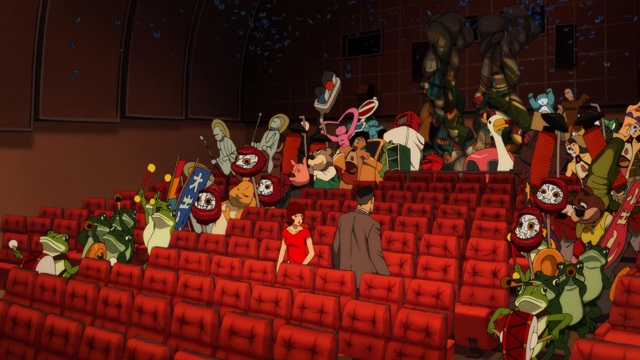The original Ghost in the Shell was such an immediately iconic blend of themes and images that it spawned hundreds of children in its wake. Many different projects proudly displayed this influence, from the anime series Serial Experiments: Lain to the American film The Matrix. Of these children, Satoshi Kon might be the most successful in synthesizing new realities based on the original movie.
Kon’s first feature film, Perfect Blue, was a Hitchcockian take on the cyberpunk identity thriller. Mima, a beautiful young pop star in a trendy girl group, decides to go solo and pursue a film career as a serious actress. Some of her fans get angry, and Mima becomes a victim of identity theft when a rabid follower co-opts her identity and proceeds to create two Mimas in the hopes of overtaking Mima’s societal position. What is reality when your life is on display? What happens when you lose track of your reality among the digital manipulations of the internet?
But, it’s Kon’s final feature film, Paprika, that turns Ghost in the Shell on its head for the new millennium. The red-headed title character is an alternate dreamworld persona of Dr. Chiba, a brunette psychiatrist who uses a dream machine to wade through her patients’ subconscious minds. In the dream world, reality bends all out of shape, switching settings and rules from scene to scene like some sort of freeform mind association game. Paprika is a powerful hero in dreamland, where she is aware of the rules and solves the dreams within these contexts.
Rather than being a retread of the 1990s cyberpunk thriller, Paprika is a hyperconnected meta-movie that embraces genre in all its forms. On the surface, Paprika blends the neo-noir cyberpunk with the psychological dream thriller with the meta-genre. But, the dreams take on their own forms influenced by a variety of other genres ranging from circus movies to musicals to Tarzan. Paprika is simultaneously a love letter to cinema and a call for adult responsibility. If fiction takes over reality what does reality become? When we are consumed by our consumption, who is in control?
I’m going to leave this one short because, as with any discovery movie, the less you know the more fun Paprika can be. Far from being a dour dark thriller, Paprika proves that even the most bright and joyful imagery can provoke tension and unease. Where Ghost in the Shell was a highlight of the techno grunge that began with Alien and Blade Runner, Satoshi Kon’s Paprika exudes a colorful naivete disguising the weirdness about to come around the next corner.


